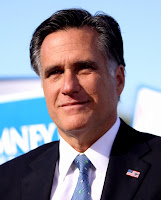With the latest results just in from the process to select the Republican candidate just in, yet another upset has materialised with the front runner, Mitt Romney, failing to win any states. This fits in beautifully with the narrative being applied to the story by the media. Republican voters are, we are told, deeply unhappy with poor choice being offered to them and are expressing this by their fickle switching from one doomed unpopular candiate to another.It must be a dispiriting business to be a Republican right now. Without a decent candidate to get behind it must be miserable.
But I wonder if this is the real story? Is there something else to explain it?
Lets deal with the quality of the candidates first. They are a rum bunch, there is no doubt about that. But is that any different to usual for Republican candidates? Barry Goldwater springs to mind as an example of someone who wouldn’t be someone you would necessarily want to leave in your home unsupervised. Ronald Reagan managed to convince most of us in Europe that if he won it wouldn’t be long before the bombs would be dropping to start world war three. The fairly obviously sane John McCain had to recruit the completely barking Sarah Palin to give his ticket the appropriate barminess level. And it isn’t just Republicans. Most political figures look a bit suspect at the point that they first appear in the minds of the wider public. What appeals to the true believers usually bewilders the less committed initially.
So I can’t help thinking that the motley bunch of chancers we are presented with are not really so much more deranged or bonkers than we normally think they are at this stage in the game. So why the volatility? Every contest seems to be on a knife edge and every prediction of the outcome of a particular state gets confounded when the results come out. Even the really eccentric candidate, my personal favourite as it happens, Ron Paul very nearly managed to swing one state despite national opinion polls that make him about as likely to win as Fidel Castro.
I think what we are actually seeing is the development of a new level of sophistication when it comes to identifying people’s voting intentions. With the kind of demographic information that companies like Facebook can produce, it must now be possible to target a well funded candidate’s efforts with enormous precision. This must be incredibly effective in a caucus style system where the headline outcome might depend on only a few voters turning out in a particular district. As the process continues all the candidates have different objectives and strategies, but all have the ability to find just the people they need to win over. Consequently, it looks like a mess from the outside but is probably going not too far from plan inside the camps. Who is going to win? I would predict the team with the deepest pockets. Presidential politics has always been a game for the well funded. It has become even more so.

